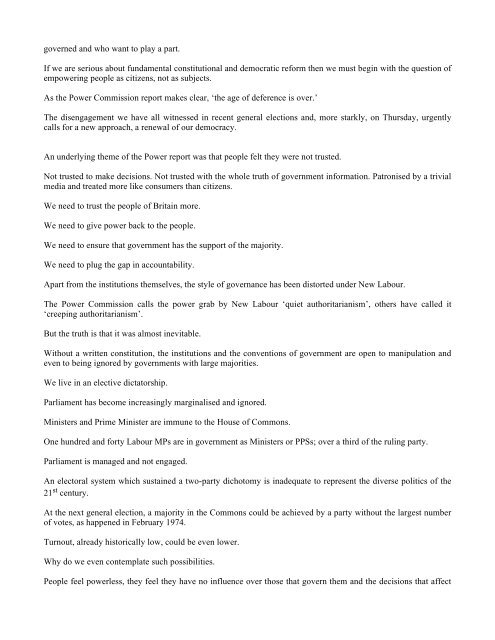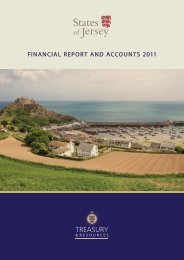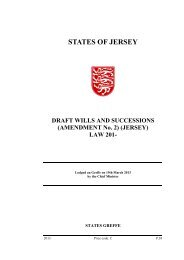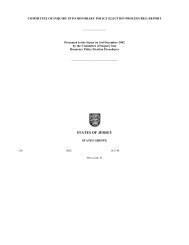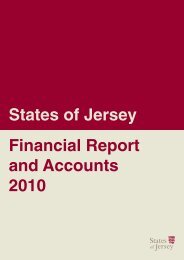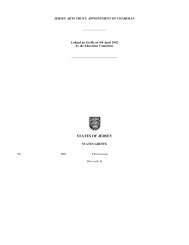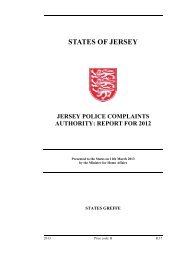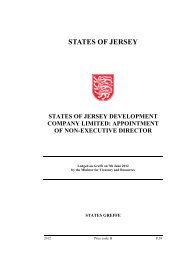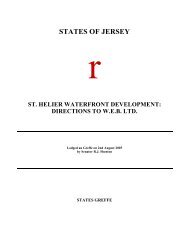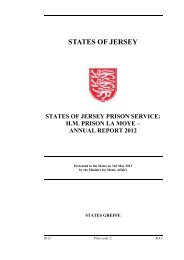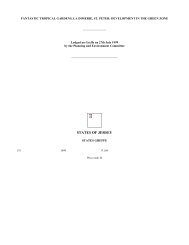Public Elections - reduction in voting age to 16 - States Assembly
Public Elections - reduction in voting age to 16 - States Assembly
Public Elections - reduction in voting age to 16 - States Assembly
You also want an ePaper? Increase the reach of your titles
YUMPU automatically turns print PDFs into web optimized ePapers that Google loves.
governed and who want <strong>to</strong> play a part.<br />
If we are serious about fundamental constitutional and democratic reform then we must beg<strong>in</strong> with the question of<br />
empower<strong>in</strong>g people as citizens, not as subjects.<br />
As the Power Commission report makes clear, ‘the <strong>age</strong> of deference is over.’<br />
The diseng<strong>age</strong>ment we have all witnessed <strong>in</strong> recent general elections and, more starkly, on Thursday, urgently<br />
calls for a new approach, a renewal of our democracy.<br />
An underly<strong>in</strong>g theme of the Power report was that people felt they were not trusted.<br />
Not trusted <strong>to</strong> make decisions. Not trusted with the whole truth of government <strong>in</strong>formation. Patronised by a trivial<br />
media and treated more like consumers than citizens.<br />
We need <strong>to</strong> trust the people of Brita<strong>in</strong> more.<br />
We need <strong>to</strong> give power back <strong>to</strong> the people.<br />
We need <strong>to</strong> ensure that government has the support of the majority.<br />
We need <strong>to</strong> plug the gap <strong>in</strong> accountability.<br />
Apart from the <strong>in</strong>stitutions themselves, the style of governance has been dis<strong>to</strong>rted under New Labour.<br />
The Power Commission calls the power grab by New Labour ‘quiet authoritarianism’, others have called it<br />
‘creep<strong>in</strong>g authoritarianism’.<br />
But the truth is that it was almost <strong>in</strong>evitable.<br />
Without a written constitution, the <strong>in</strong>stitutions and the conventions of government are open <strong>to</strong> manipulation and<br />
even <strong>to</strong> be<strong>in</strong>g ignored by governments with large majorities.<br />
We live <strong>in</strong> an elective dicta<strong>to</strong>rship.<br />
Parliament has become <strong>in</strong>creas<strong>in</strong>gly marg<strong>in</strong>alised and ignored.<br />
M<strong>in</strong>isters and Prime M<strong>in</strong>ister are immune <strong>to</strong> the House of Commons.<br />
One hundred and forty Labour MPs are <strong>in</strong> government as M<strong>in</strong>isters or PPSs; over a third of the rul<strong>in</strong>g party.<br />
Parliament is man<strong>age</strong>d and not eng<strong>age</strong>d.<br />
An elec<strong>to</strong>ral system which susta<strong>in</strong>ed a two-party dicho<strong>to</strong>my is <strong>in</strong>adequate <strong>to</strong> represent the diverse politics of the<br />
21 st century.<br />
At the next general election, a majority <strong>in</strong> the Commons could be achieved by a party without the largest number<br />
of votes, as happened <strong>in</strong> February 1974.<br />
Turnout, already his<strong>to</strong>rically low, could be even lower.<br />
Why do we even contemplate such possibilities.<br />
People feel powerless, they feel they have no <strong>in</strong>fluence over those that govern them and the decisions that affect


